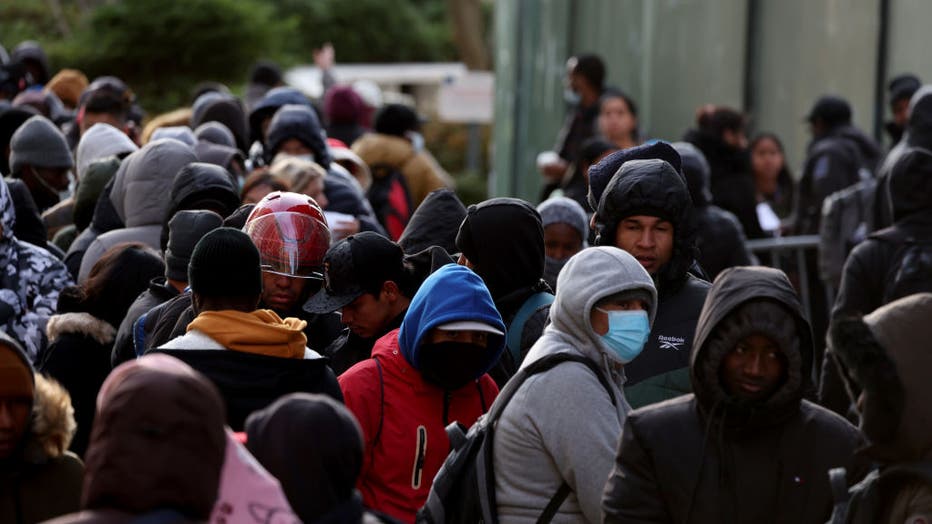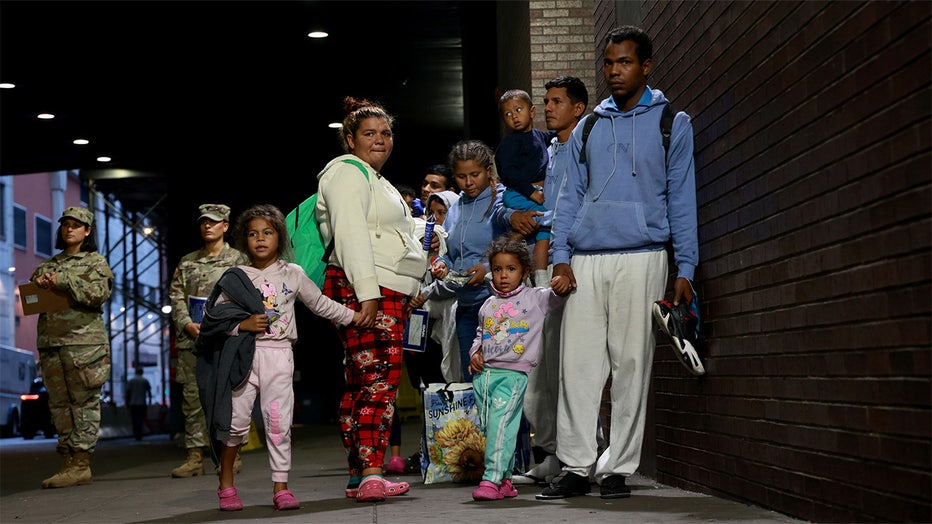NYC migrant shelter policy 'haphazard,' issues include evicting pregnant women: audit
Migrants in America: Full Episode
New York City is in the midst of an unexpected migrant crisis. Asylum seekers are making their way here in record numbers. FOX 5 NY's Stephanie Bertini explores the reality of what's going on at home and abroad.
NEW YORK - A New York City policy imposing 60-day limits on shelter stays for migrant families was rolled out haphazardly over the past six months — with issues such as the city failing to notify pregnant women they may be exempt, a new audit by the city's comptroller has found.
The city began evicting migrant families in early January in order to ease pressure on its strained shelter system. However, women in their last trimester of pregnancy were exempted after news that 26-year-old who was nearly nine months pregnant was among those moved out.

Thousands of migrants, assylum seekers are pictured lining up outside The Jacob Javits Federal Building in downtown Manhattan early Tuesday December 05, 2023. (Photo by Luiz C. Ribeiro for NY Daily News via Getty Images)
That policy was never actually written down or communicated properly to agencies, shelter providers or the women themselves, according to the report released by Comptroller Brad Lander this week.
"No written policy was ever promulgated. Staff and contractors did not get that information. The notice that you get when you get a 60-day notice doesn’t tell you that if you’re pregnant, you’re exempt," Lander said Thursday at a news conference.
The city's policy allows families to reapply for shelter beds, although doesn't guarantee another bed.
How NYC's makeshift migrant shelters work
FOX 5 NY has learned that the man accused of operating makeshift shelters for migrants was also running another space for in an abandoned library back in January. FOX 5 NY's Stephanie Bertini has the story.
Addressing concerns that kids might wind up on the other side of the city from their schools, city officials said at the time that they would try to keep families in or near the districts where their children are enrolled.
But Lander's audit says educators and families reported to his office that they didn't receive this courtesy. It said at least three families at an elementary school in Brooklyn left the shelter system not because they were ready, but because they were offered placements in other boroughs.
Lander urged Mayor Eric Adams to suspend the 60-day rule until the end of the school semester.

Dozens of migrants/immigrants families are seen arriving from Texas at the Port Authority Bus Terminal early Wednesday September 6, 2023. (Photo by Luiz C. Ribeiro for NY Daily News via Getty Images) ( (Photo by Luiz C. Ribeiro for NY Daily News via Getty Images) / Getty Images)
The report did not systematically document housing, health, or educational outcomes for immigrants leaving a shelter. Lander said the city hasn’t done that either, tracking only whether immigrants stayed in the shelter system or not.
Responding to Lander's report, the mayor's office says the 60-day eviction notices — along with 30-day notices for single adult migrants — are one of the few tools it has to nudge migrants out of shelters.
"Nearly half of all families who have seen their 60-day notices expire, and more than 65 percent of all migrants that have come through our care, have moved out of our shelter system — without a single migrant family with children being forced to sleep on the street," City Hall spokesperson Kayla Mamelak said in a statement.
Fewer than one in five children were disenrolled from their school after their family's eviction notice expired, according to the statement.
New York is one of the few cities in the U.S. legally obligated to provide shelter to all people who ask for it, the result of a decades-old legal case. Separately, U.S. schools are legally obligated to enroll immigrant students who are minors, regardless of their parent’s immigration status.
Mamelak reiterated the city's position that the Biden administration needs to fill in funding gaps for refugee resettlement programs. Those federal programs benefit virtually none of the 65,000 immigrants in the New York shelter system — many of whom are asylum applicants or have temporary legal status but not refugee status.
"A national humanitarian crisis requires a national solution," Mamelak said.
Immigrant advocates say they’re having to help hundreds of parents individually negotiate with shelter officials to let them stay in their neighborhood.
Shuffling families between shelters is a daily problem for New York City council member Gale Brewer and her staff in Manhattan, who have handled dozens of cases flagged by schools and other community members.
"We’ll get a call: ‘They’re on their way to Queens,’ and we panic," Brewer said.
Some of the schools in her district benefit from immigrant students because they are under-enrolled, and homeless students bring additional funding. The schools are often a good fit for the students because they have diverse language offerings.
Staff members, school workers and parent volunteers hurriedly assemble paperwork for the kids. To help families remain in their current shelter or get moved to one nearby, Brewer says city officials have stuck to an informal agreement — a system she likens to a modern-day "underground railroad."

